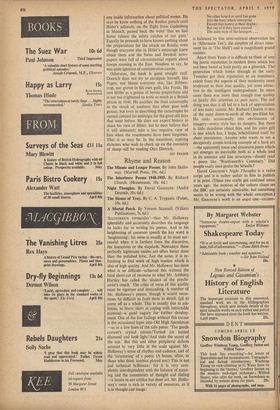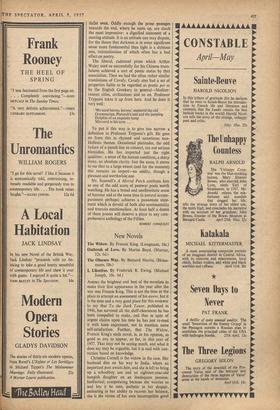Rhyme and Reason
A Mortal Patch. By Vernon Scannell. (Villiers Publications, 7s. 6d.) 'ILLUSTRIOUS vernacular'—thus Mr. Holloway splendidly and accurately describes the language he looks for in writing his poems. And in his heightening of common speech the key word is `heightening': his verse is usually at its most suc- cessful when it is farthest from. the discursive, the humorous or the slapdash. Nowadays these perfectly legitimate modes are often better done than the polished lyric. Just the same, it is re- freshing to find work of high tension which is also of high quality. And Mr. Holloway has done what is so difficult—achieved this without the fatal short-cut of recourse to what Mr. Anthony Hartley has called the 'dialect of the psychi- atrist's couch.' The critic of verse of this quality must be rigorous and demanding. A number of Mr. Holloway's poems, though it would some- times be difficult to fault them .in detail, fpil to come off as a whole. This is usually due to am- bition, to brave shots at coping with intractable material—a goOd augury for further develop- ment. One of the few failings without this excuse is the occasional lapse into Old High Spenderese —as in a few lines of the title poem: The gentle current's crystal stream/Turned ice turned diamond and took light/And stole the secret of the sun.' But this and other peripheral defects amount to very little in the scale against Mr. Holloway's sense of rhythm and cadence, and of the 'structuring' of a poem. (A lesson, often, to those who think iambics played out.) This is not just technical brilliance : for it is very com- pletely interdependent with the balance of mean- ing and the momentum of thought and feeling —a lesson in not artifice but sheer art. Mr. Hollo- way's verse is rich in variety of resources, as it is in thought and image : No other hoard or spoil has gone Into the bees' whole enterprise Except that honey at their thighs : But out of it they have created The calm style of the hexagon....
is balanced by fine semi-satirical observation (as in 'Afternoon Tea'), the simplest of direct state- ment (as in 'The Shell') and a magnificent grand manner.
Apart from Yeats it is difficult to think of any big poetic reputation in modern times which has not been based at least partly on a gimmick. The generation which broke through in the early
Twenties got their reputation to an inordinate extent from the aspects of their modernity most irrelevant to their true quality, yet most attrac- tive to the intelligent undergraduate. In some cases there was more than enough true quality to justify this attention ex post facto. The sad thing was that it all led to a lack of appreciation of less noisy talents. Mr. Richard Church is one of the most down-to-earth of the pre-Eliot lot. He sinks occasionally into obviousness of imagery—every style has its dangers. But there is little datedness about him, and his quiet gift is one which has, I hope, rehabilitated itself by sheer persistence. Anyone who wants to see a deceptively simple-looking example of a hard art —the apparently loose and discursive poem which, yet emerges as inevitable both as a whole and in its sentence and line structures—should read a poem like Vordsworth's Centenary.' Did people really once prefer the Sitwells?
David Gascoyne's Night Thoughts is a radio script and it is rather unfair to him to publish it in print. (These two crafts got confused some years ago : the motives of the culture chaps on the BBC are certainly admirable, but something seems to be wrong with the whole conception.) Mr. Gascoyne's work is an angst one—existen-
tlalist even. Oddly enough the prose passages towards the end, where he sums up, are much the most impressive : a dignified statement of a moving attitude. It is an attitude one may dispute, for the theme that darkness is in some significant sense more fundamental than light is a dubious one, rationalisation of which often has a bad effect on poetry.
The liberal, cadenced prose which Arthur Waley used so successfully for his Chinese trans- lations. achieved a sort of poetic status by that association. Then we had the often rather similar translations of Cavafy. Cavafy also had a set of properties liable to be regarded as poetic per se by the English Greekery in general—Mediter- ranean cities, civilisations and so on. Professor
Trypanis takes it up from here. And he does it very well : 'We need heroes, heroes,' muttered the old Grammarian, Plutarch's text and the jumping Dolphin of an exquisite lamp Mirrored in his eyes....
To put it this way is to give too narrow a definition to Professor Trypanis's gift. He goes on from this to rhymed and sometimes non- Hellenic themes. Occasional platitudes, the odd failure of a punch line to connect, are not serious blemishes. He has imported just the right qualities : a sense of the human condition, a sharp irony, an absolute clarity. Just the same, it seems to me that to a large extent (and for the moment) this remains an import—an oddity, though a pleasant and worthwhile one.
Mr. Scannell's A Mortal Patch confirms him as one of the odd score of postwar poets worth
watching. He has a broad and uneffeminate sense of humour and at the same time (a natural accom- paniment perhaps) achieves a passionate state- ment which is devoid of both alto sentimentality and tremolo emotionalism. At least half a dozen of these poems will deserve a place in any com- prehensive anthology of the Fifties.
ROBERT CONQUEST













































 Previous page
Previous page